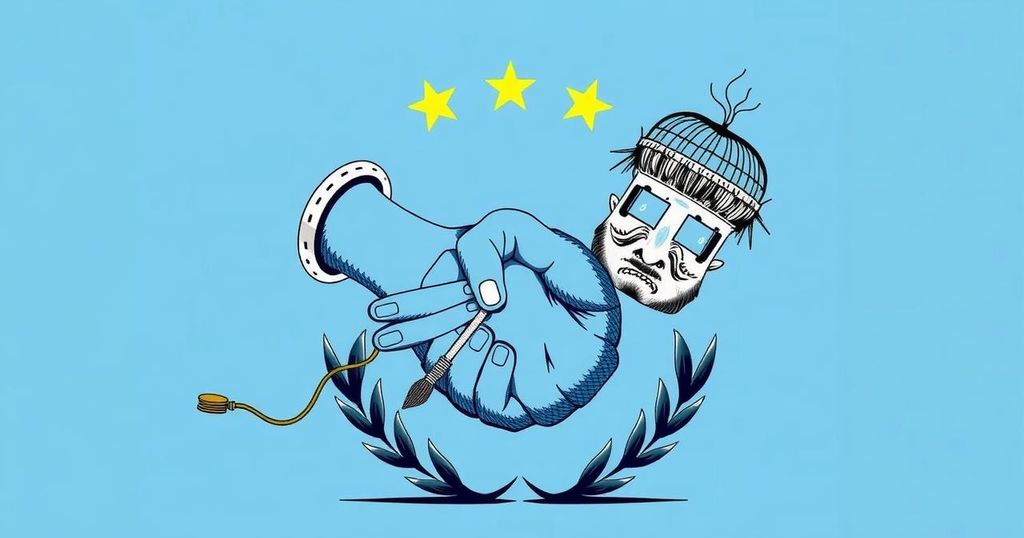Uruguay’s Elections: A Call to Address Youth Disengagement and Discontent
Uruguay’s recent presidential elections were marked by voter apathy and unappealing candidates leading to a runoff devoid of excitement. The youth feel marginalized despite Uruguay’s democratic track record, as they grapple with socioeconomic issues like high unemployment and educational challenges. Both young and older generations express dissatisfaction with government performance, raising concerns about political engagement in a nation historically known for its civic vibrancy.
In the recent presidential elections in Uruguay, voter engagement was surprisingly low, with candidates failing to excite the electorate. This lack of enthusiasm was emblematic of the current political landscape, where difficult circumstances have left many voters disillusioned. Following a first-round election without a majority winner, the atmosphere surrounding the runoff is characterized by political fatigue and concerns over youth disaffection.
Historically, Uruguay’s elections have been vibrant and animated, a reflection of its political culture that values democratic processes following years of dictatorship. Yet in contrast, this year’s elections were overwhelmingly mundane, indicating a departure from the passionate civic engagement of past electoral events. Despite this, there is an underlying urgency that warrants attention. The youth in Uruguay feel increasingly neglected, and alarming statistics reveal high unemployment and educational challenges within this demographic, raising questions about the future stability of what is regarded as one of Latin America’s strongest democracies.
Indeed, the Latinobarómetro poll in 2023 illustrates that 38 percent of young people are willing to forgo democratic governance in favor of more efficient problem-solving leadership. Social issues resonate deeply with the younger populace, who face staggering rates of unemployment, educational dropout, and food insecurity. Added to this is the legacy of trauma wrought by the Covid-19 pandemic, which has adversely affected mental health outcomes among youth, with rising suicide rates contributing to their despair.
Older generations are not immune to dissatisfaction, as concerns mount over childhood poverty, economic pressures, and governance challenges, including corruption. Disappointment runs high with broader socio-economic mismanagement and declining trust in leadership. This discontent has culminated in political apathy, particularly among younger voters, who describe frontrunner candidates Yamandú Orsi and Álvaro Delgado as somewhat disconnected from their realities, leading to a lack of engagement in the electoral process.
The upcoming runoff needs to address these pressing issues, as the promise of democracy in Uruguay hinges on reviving political engagement and reconnecting with a populace that feels increasingly alienated from their leaders. Navigating these challenges effectively will prove crucial for sustaining the nation’s democratic ideals and addressing the frustrations that could precipitate a more serious political crisis.
The article discusses the recent presidential elections in Uruguay, highlighting a lack of excitement and engagement among voters, particularly the youth. Previously known for their spirited political atmosphere, the absence of compelling candidates has cast a pall over this electoral cycle. Despite the country’s reputation for political stability and democracy, significant socioeconomic concerns plague the younger generation, prompting feelings of disenfranchisement and a willingness to abandon democratic principles in search of solutions to their pressing challenges.
The current electoral landscape in Uruguay signals a troubling trend of disillusionment among voters, especially the youth, who face significant socioeconomic hurdles exacerbated by government performance issues. With traditional enthusiasm for democracy waning, there is an urgent need for candidates to connect with the populace and address systemic problems effectively. The potential disengagement of young voters poses risks not only to the integrity of the electoral process but also to the future stability of one of Latin America’s prominent democracies.
Original Source: www.nytimes.com




Post Comment